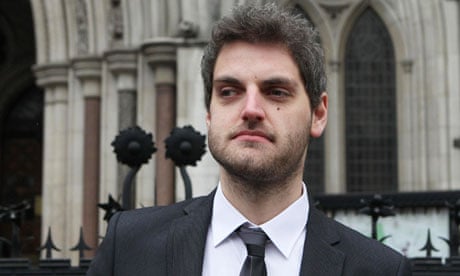A message sent on Twitter threatening to blow up a snowbound airport unless it reopened was not "menacing" and was like a comic cracking a joke on stage, the lord chief justice was told at the high court .
In the latest appeal by Paul Chambers against his criminal conviction, John Cooper QC told three senior judges that the punishment for a tweet sent to about 600 followers in January 2010 should be overturned because a district judge had misapplied the law and the conviction breached Chambers's right to freedom of expression.
When Chambers sent the tweet that landed him a £1,000 fine and a criminal record, he planned to fly from Doncaster to Northern Ireland to see a woman he had just met. He wrote: "Crap! Robin Hood airport is closed. You've got a week and a bit to get your shit together, otherwise I'm blowing the airport sky high!!"
A week later the message was seen by an off-duty airport employee and, after it was escalated, Chambers was arrested and later convicted at Doncaster crown court of sending a message of a "menacing character" under the Communications Act 2003.
The case has become a cause célèbre for those concerned about freedom of expression and how social media, as well as attracting the interest of top comedians is policed. Chambers arrived in court accompanied by Stephen Fry, the comedian Al Murray and the comedy writer Graham Linehan, who have supported him throughout his legal battle.
Murray said the outcome of the case would affect all of Britain's estimated 10 million Twitter users. "The conviction is crazy, there is no other way of putting it," he said. "It is like saying 'oh God, I could murder the boss', that's all there is to it. The law is being made to look absurd."
Cooper told Lord Judge, Mr Justice Owen and Mr Justice Griffith Williams that the case turned on whether the tweet was of "menacing character" and Judge agreed, saying: "That rather is our view and that is what we have to address."
"His account was mainly humorous in tone and touched on a developing relationship," said Cooper. "All those who followed him would have known this and would have realised the perspective from which this man was communicating." He highlighted the exclamation marks after "Crap!" and "sky high!!", adding: "The expression 'you have a week and a bit' is hardly indicative of a threat intended to be menacing".
He said Chambers had not tried to hide his identity and it was "certainly not a message sent by a terrorist and it was wrong of the crown court in Doncaster to make a connection between this case and terrorism".
Cooper said a menacing threat should cause "the mind of an ordinary person of normal stability and courage" to be "influenced or made apprehensive" and the sender must intend to threaten the person to whom it is likely to be conveyed. Chambers's tweet fell short of these tests, he said.
Chambers's legal team also said the conviction failed to take into account human rights law relating to freedom of expression. "It is society that will rule on whether that joke is acceptable and not a criminal code," Cooper said. "There is a right enshrined for people to make jokes that others may regard as offensive."
He said if jokes were vetted by the courts, John Betjeman would have had cause to be concerned when he wrote "Come, friendly bombs, and fall on Slough", adding "and Shakespeare when he said 'kill all the lawyers'."
Judge replied: "That was a good joke in 1600 and it is still a good joke now," following laughter in court.
"And it was a joke," said Cooper. "By any view, he was foolish to do what he did," said Robert Smith QC, appearing for the director of public prosecutions. "The question remains by whose standards and what members of the society would view this as a joke or humorous, given that members of society who had access to the message may not or would not have knowledge of the circumstance which led Mr Chambers to send the message."
The judges reserved judgment until a later date.
